21 Aug 2017 - {{hitsCtrl.values.hits}}
Kidney Transplant Support Foundation
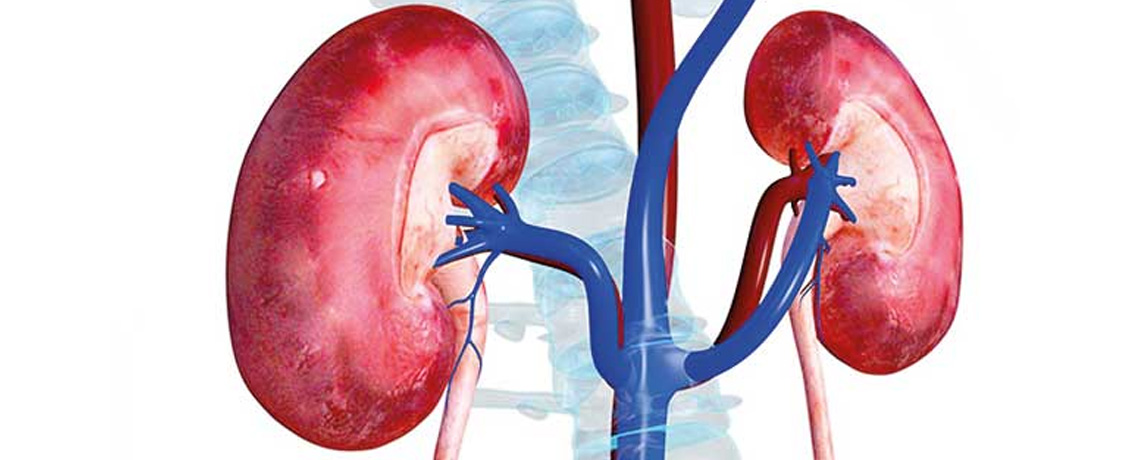
"This project, able to give the hope of life to many is being neglected by the responsible parties today, laments its founder, grieving for the brainchild withering away before it reached its full potential"
A 41-year-old mother of three is looking for an O+ kidney. If you are willing to donate, please contact ... Most of our readers would be familiar with this sort of advertisement. While there are hundreds of Chronic Kidney Disease (CKD) patients awaiting transplantation, luckily, our country also have many kind souls who step into help those who are in need, even though they are not related by blood. But the problem lies in connecting the ‘needy’ with the ‘willing’.
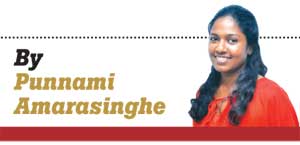 Seeing that the cost of the lack of coordination between the two parties was death for the patients awaiting transplantation, Mr. Ajit F. Perera had the inspiration to instigate a ‘free of cost’ programme that acted as a ‘third party’, matching the willing donors and the recipient through a computer, eliminating human bias as an additional benefit. The result was the Kidney Transplant Support Foundation (KTSF), implemented in 2009, of which he is the chairman. This organization won the first Joel D. Koppel award presented by the International Federation of Kidney Foundation in 2010. This international award in itself speaks for the success of the programme.
Seeing that the cost of the lack of coordination between the two parties was death for the patients awaiting transplantation, Mr. Ajit F. Perera had the inspiration to instigate a ‘free of cost’ programme that acted as a ‘third party’, matching the willing donors and the recipient through a computer, eliminating human bias as an additional benefit. The result was the Kidney Transplant Support Foundation (KTSF), implemented in 2009, of which he is the chairman. This organization won the first Joel D. Koppel award presented by the International Federation of Kidney Foundation in 2010. This international award in itself speaks for the success of the programme.
Under the project, the foundation provided 20 computers with ADSL facilities for the purpose of launching the donor registration procedure in 20 hospitals distributed around the country, utilizing funds provided by a World Bank grant. When a potential donor goes to the nearest hospital and register his details there, all the computers in other 19 hospital would receive this information.
But this project, able to give the hope of life to many is being neglected by the responsible parties today, laments its founder, grieving for the brainchild withering away before it reached its full potential.
"Each year, about 2500 die of road traffic accidents. If we can utilize at least 5% of these people’s organs to give the gift of life back to someone else, we can save many lives"
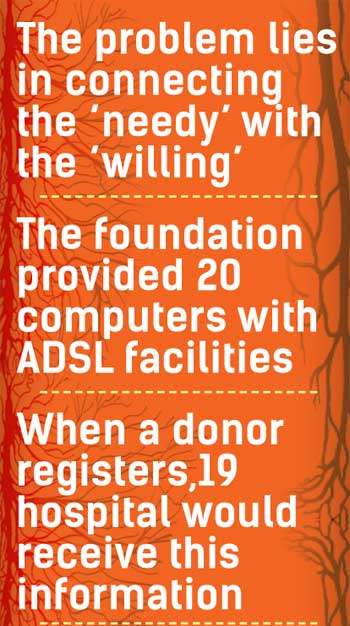 CKD
CKD
CKD is not a new topic to the healthcare sector. It can manifest as a disease in the kidney itself or may develop over a period of time as a result of various factors like Diabetes Mellitus, and Hypertension. In Sri Lanka, a percentage of these cases occur due to CKDu or Chronic Kidney Disease of Unknown etiology that has manifested in some parts of the country. A small, but a significant percentage of these patients go into Kidney failure also called End Stage Renal Failure (ESRF), needing long term, expensive dialysis or kidney transplantation to continue their lives. There are over 8000 patients suffering from ESRF, with hundreds adding to the number each year. Many of their lives depend on finding a matching kidney at the right time.
Talking about transplantation, it can be done in two ways, Either via deceased donor transplantation, or live donor transplantation.
Live donor transplantation is where a healthy living person decides to give away one of his kidneys to a person whose both kidneys are not functioning. Either a relative of the family or another person can be the donor in this case.
Taking the above into consideration, it is no wonder that organ trade is one of the world’s most lucrative business, despite organ selling being a punishable offence violating international laws, in addition to being highly unethical. Therefore, every time a doctor is performing a transplantation amongst a patient and a live donor who is not a relative, there is the justifiable doubt of the possibility of a monetary transaction amongst the two parties.
But the KTSF eliminates this threat because only the volunteers who want to donate their kidneys free of charge and without conditions are recruited, and then the computer goes onto select the best donor through a selection criteria which has been fine tuned by the specialist doctors in the field, explains Perera.
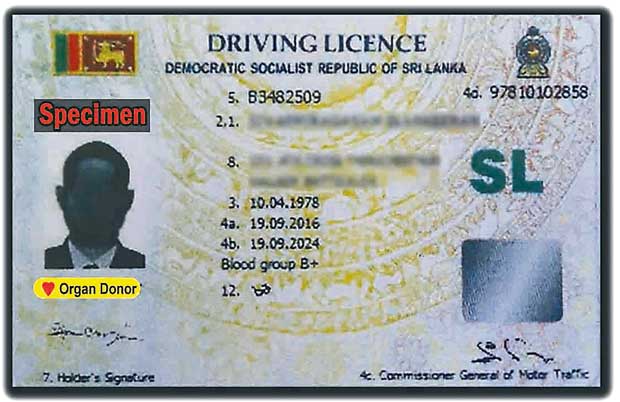
Specimen DL with Donor Symbol Yellow
Going against the currents
According to Perera, this programme, implemented in 2009, was handed over to the government for continuation in 2011. Despite the numerous success stories of patients who received matching donors through it before the handover, the foundation is still on the rocks, more than six years later. What is the reason that this programme which can apparently benefit many, is not functioning properly? He states that this is due to the lack of support from some medical officers involved in kidney transplantation process. The tardiness in the officials of the Ministry of Health doesn’t help either, he states.
So far it has been an upstream battle for him. He has been writing to the relevant official since 2012 , trying to get the programme back on the ground with no visible effect.
Among the many that added to the obstacles in his journey, there were some people with similar visions who willingly accompanied him in this difficult road. Dr. A.M.L Beligaswaththa, former Director General of Health Services is one such person. In an interview conducted with our sister paper daily Lankadeepa, Dr. Beligaswaththta states that the reason for the failure of this project is the attitude of certain people in the health sector. “If this project by Mr. Ajit Perera, which functioned as a charity organization had proper government patronage, it could have been the best programme helping the Sri Lankan citizens awaiting kidney transplantation”, he comments.
"While the people who are ‘brain dead’, meaning that their hearts keep functioning even though their brains are irreversibly damaged are the preferred donors, since the blood supply to the kidney remains uninterrupted, the kidneys of people who died because their hearts stopped functioning also can be utilized in transplantation"
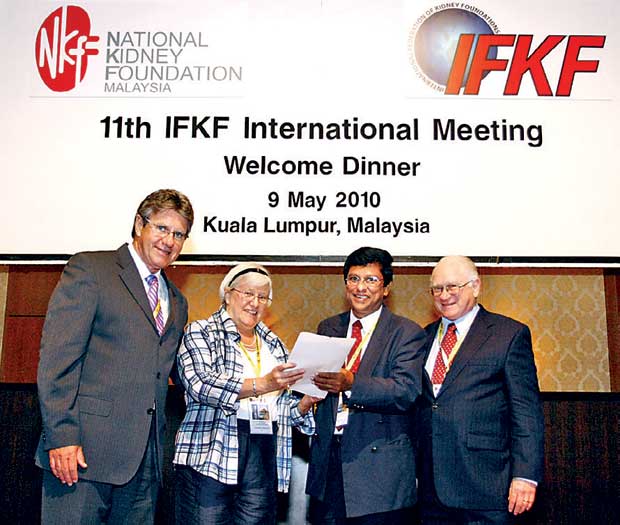 A man with a vision
A man with a vision
Ajit Perera, coming from a family of a long line of philanthropists is no stranger to giving to the people of the country, expecting no benefits in return. His father was late Wilmot A. Perera, the founder of Sripali Vidyalaya in Horana. His great grandfather was Charles Henry De Soysa (C.H.De Soysa) who was one of the greatest Philantropist in recent times, donating 4 hospitals and the Medical Research Institute, the Prince & Princess of Wales Colleges etc. His great grandmother Mrs. Jeremias Dias was the founder and benefactor of Visakha Vidyalaya. He himself has donated the land and building which now form the Sri Palee Campus.
His efforts in this specific field of interest are not limited to KTSF. Since the number of volunteers who are willing to give away a kidney while alive is limited, he wanted to reach beyond live donors to focus on cadaveric organ donations. While the people who are ‘brain dead’, meaning that their hearts keep functioning even though their brains are irreversibly damaged are the preferred donors, since the blood supply to the kidney remains uninterrupted, the kidneys of people who died because their hearts stopped functioning also can be utilized in transplantation, if harvested immediately, according to Perera. “Each year, about 2500 die of road traffic accidents. If we can utilize at least 5% of these people’s organs to give the gift of life back to someone else, we can save many lives”, he declares.
"If this project by Mr. Ajit Perera, which functioned as a charity organization had proper government patronage, it could have been the best programme helping the Sri Lankan citizens awaiting kidney transplantation"
‘Willingness to donate’ expressed in the Driving License
That is why he had been trying to persuade the authorities to include a symbol indicating that a person is willing to be an organ donor in their driving license, for more than eight years. He has seen some positive light in this project because as Perera says, a person who is applying for a driving license can now express his willingness to become an organ donor through a special symbol included in the license itself. He says that over 12000 new driving licenses are carrying this symbol.
Perera plans to develop this concept further so that the Police, when they take a victim of an accident or a dead body to the hospital, they have to inform the hospital authorities that the person has given his consent to become an organ donor in case of his death. So unfortunately if the inevitable happens, the doctors will be prepared and his organs will give life to someone else, making some good out of a bad situation. This would be a small consolation for the family of the deceased as well, since a small part of their loved one is still living, blowing life to another human being. He is hopeful that the authorities in the healthcare sector would share his vision to make it a reality, benefitting thousands of Sri Lankan citizens tomorrow.
Mr. Ajit Perera can be contacted via [email protected] for further details regarding the donor programmes
23 Dec 2024 12 minute ago
23 Dec 2024 21 minute ago
23 Dec 2024 21 minute ago
23 Dec 2024 2 hours ago
23 Dec 2024 3 hours ago